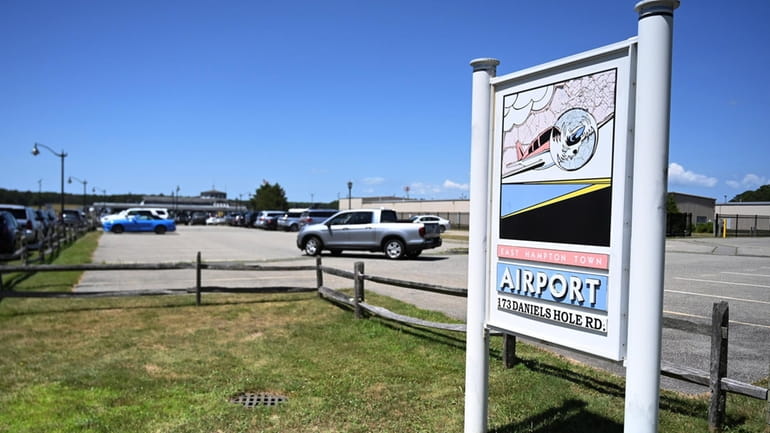Appellate court ruling will keep East Hampton's airport open

A state appellate court recently upheld a lower court’s ruling that blocked the Town of East Hampton from closing its Wainscott airport. Credit: John Roca
A state appellate court recently upheld a lower court’s ruling that blocked the Town of East Hampton from closing its Wainscott airport — the latest setback in the town’s nearly decade-long effort to reduce air traffic.
Aviation interests and Montauk residents filed three separate lawsuits against the town in 2022 aimed at halting the town’s plan to temporarily close the public airport and reopen it as a private facility as a way to gain more control over operations.
The East Hampton Town Airport long has been a source of aggravation among some East End residents who have complained about constant noise, particularly during summer.
The March 27 decision from the Appellate Division's Second Department reaffirmed an October 2022 state Supreme Court ruling that blocked the town from closing the airport or imposing new restrictions.
The town plans to appeal to the state’s highest court, according to an April 1 court filing. The Court of Appeals, however, must agree to hear the case.
The airport remains open and “fully functional,” according to East Hampton Town officials, who added that they were “deeply disappointed” in the appellate court decision.
The appellate court’s four-judge panel said the lower court properly ruled the town failed to comply with federal requirements of the Airport Noise and Capacity Act, which sets procedures for implementing restrictions on aircraft operations and noise limits. The town argued the Airport Noise and Capacity Act does not apply to airport closures or private use airports, according to the appellate court decision.
Congress passed the act in 1990 to limit the ability of airports and local communities to implement new noise restrictions and curfews, according to the FAA. To implement those changes, airport owners must follow what’s called a Part 161 study, the FAA said.
Completing a Part 161 study, however, does not guarantee the FAA will approve the proposed restrictions. And the FAA said, to date, it hasn't approved restrictions on the type of aircraft that frequent the town's airport.
The town considered a Part 161 study after a court struck down laws passed in 2015 to restrict late night and early-morning flights after a coalition of nine pro-aviation groups successfully sued the town. But the town later abandoned that process, estimated to cost millions of dollars, based on legal advice, Newsday previously reported.
East Hampton officials said they remain committed to finding a solution to noise and environmental concerns.
“The status quo is not acceptable,” town officials said in a statement.
Kelly Bloss, a Montauk resident and petitioner in one of the lawsuits brought by the Coalition to Keep East Hampton Airport Open, said in an interview she hopes the recent decision will signal to the town it's time to start working with aviators to “manage the flight path and the noise and the existing infrastructure" at the airport.
Bloss and other Montauk residents have argued that reducing air traffic in East Hampton would cause a problematic ripple effect by sending more aircraft to the smaller, privately-owned airport near Lake Montauk.
The state Supreme Court ruling in 2022 also found the town had failed to examine environmental impacts related to its effort to close the public facility and reopen it as a private facility, as required under the State Environmental Quality Review Act.
In the past year, the town has been conducting a lengthy environmental review process and currently is accepting written comment on an approximately 2,000-page environmental impact statement draft.
The appellate court ruling doesn't address the state environmental review and town officials said that process will continue.
The town board approved a resolution Tuesday to extend the written comment period on the draft statement to May 3 before a special meeting Wednesday, where they held an executive session to discuss the appellate court's ruling.
James Catterson, an attorney for some of the petitioners, said in a statement that the court’s “unequivocal decision is consistent with every previous court decision which has denied the Town motions.”
He added that the town “has lost at every turn."
A state appellate court recently upheld a lower court’s ruling that blocked the Town of East Hampton from closing its Wainscott airport — the latest setback in the town’s nearly decade-long effort to reduce air traffic.
Aviation interests and Montauk residents filed three separate lawsuits against the town in 2022 aimed at halting the town’s plan to temporarily close the public airport and reopen it as a private facility as a way to gain more control over operations.
The East Hampton Town Airport long has been a source of aggravation among some East End residents who have complained about constant noise, particularly during summer.
The March 27 decision from the Appellate Division's Second Department reaffirmed an October 2022 state Supreme Court ruling that blocked the town from closing the airport or imposing new restrictions.
The town plans to appeal to the state’s highest court, according to an April 1 court filing. The Court of Appeals, however, must agree to hear the case.
The airport remains open and “fully functional,” according to East Hampton Town officials, who added that they were “deeply disappointed” in the appellate court decision.
The appellate court’s four-judge panel said the lower court properly ruled the town failed to comply with federal requirements of the Airport Noise and Capacity Act, which sets procedures for implementing restrictions on aircraft operations and noise limits. The town argued the Airport Noise and Capacity Act does not apply to airport closures or private use airports, according to the appellate court decision.
Congress passed the act in 1990 to limit the ability of airports and local communities to implement new noise restrictions and curfews, according to the FAA. To implement those changes, airport owners must follow what’s called a Part 161 study, the FAA said.
Completing a Part 161 study, however, does not guarantee the FAA will approve the proposed restrictions. And the FAA said, to date, it hasn't approved restrictions on the type of aircraft that frequent the town's airport.
The town considered a Part 161 study after a court struck down laws passed in 2015 to restrict late night and early-morning flights after a coalition of nine pro-aviation groups successfully sued the town. But the town later abandoned that process, estimated to cost millions of dollars, based on legal advice, Newsday previously reported.
East Hampton officials said they remain committed to finding a solution to noise and environmental concerns.
“The status quo is not acceptable,” town officials said in a statement.
Kelly Bloss, a Montauk resident and petitioner in one of the lawsuits brought by the Coalition to Keep East Hampton Airport Open, said in an interview she hopes the recent decision will signal to the town it's time to start working with aviators to “manage the flight path and the noise and the existing infrastructure" at the airport.
Bloss and other Montauk residents have argued that reducing air traffic in East Hampton would cause a problematic ripple effect by sending more aircraft to the smaller, privately-owned airport near Lake Montauk.
The state Supreme Court ruling in 2022 also found the town had failed to examine environmental impacts related to its effort to close the public facility and reopen it as a private facility, as required under the State Environmental Quality Review Act.
In the past year, the town has been conducting a lengthy environmental review process and currently is accepting written comment on an approximately 2,000-page environmental impact statement draft.
The appellate court ruling doesn't address the state environmental review and town officials said that process will continue.
The town board approved a resolution Tuesday to extend the written comment period on the draft statement to May 3 before a special meeting Wednesday, where they held an executive session to discuss the appellate court's ruling.
James Catterson, an attorney for some of the petitioners, said in a statement that the court’s “unequivocal decision is consistent with every previous court decision which has denied the Town motions.”
He added that the town “has lost at every turn."
Court ruling
- An appellate court recently upheld a lower court’s ruling blocking the Town of East Hampton from closing its municipal airport.
- Town officials plan to ask the state's highest court to consider the case and said the ruling was “deeply disappointing.”
- An attorney for some of the petitioners said the town “has lost at every turn.”
Details on the charges in body-parts case ... Gilgo-related search continues ... Airport travel record ... Upgrading Penn Station area
Details on the charges in body-parts case ... Gilgo-related search continues ... Airport travel record ... Upgrading Penn Station area

